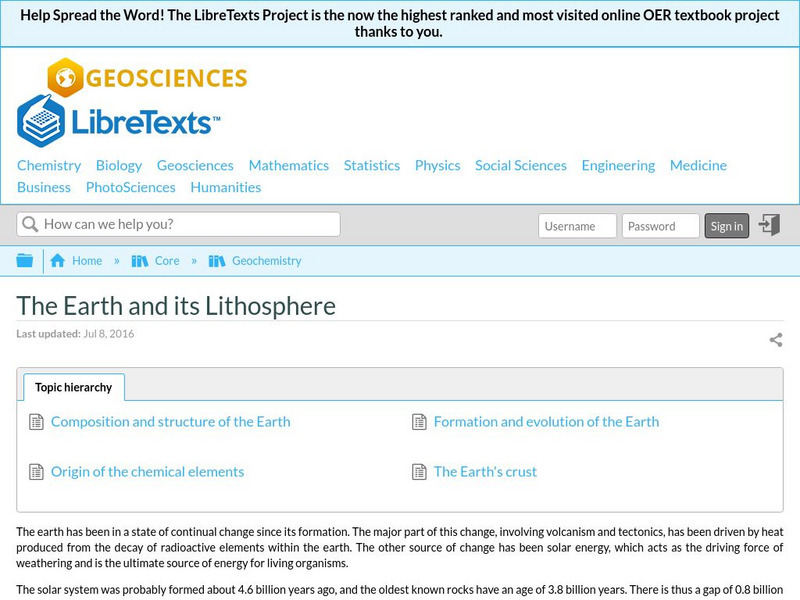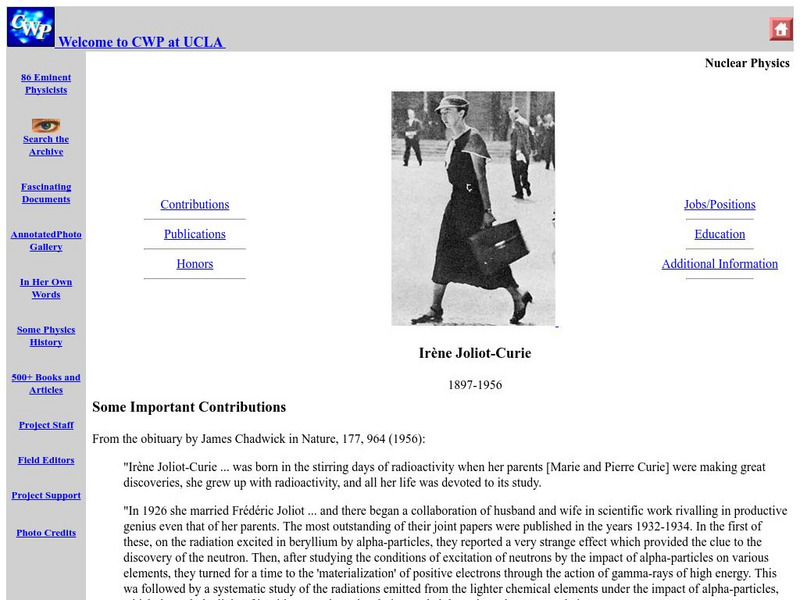Hi, what do you want to do?
CK-12 Foundation
Ck 12: Fission and Fusion
[Free Registration/Login may be required to access all resource tools.] Students will investigate fission and fusion, and discover how they play a part in nuclear chain reactions in fission bombs, nuclear power plants, and radiation in...
Texas Instruments
Texas Instruments: Numb3 Rs: A Matter of Half Life and Death
Based off of the hit television show NUMB3RS, this lesson introduces students to the topic of exponential decay and half-life. The lesson is built around Cesium-137, a radioactive isotope, and it's declining radioactivity over the course...
US Geological Survey
The Numeric Time Scale
This is a good source for getting an in-depth description of using radioactive decay to measure the ages of rocks. In addition to describing the process of radiometric dating, this resource also includes a geologic time scale and four...
CK-12 Foundation
Ck 12: Physics: Nuclear Physics Study Guide
Explore and review nuclear physics with this study guide.
TED Talks
Ted: Ted Ed: Technetium: Periodic Table of Videos
The team at periodicvideos has created a TED-Ed Lesson for every element of the periodic table. This one is about technetium. It is the first naturally radioactive element on the periodic table. [1:11]
TED Talks
Ted: Ted Ed: Bismuth: Periodic Table of Videos
The team at Periodicvideos has created a TED-Ed Lesson for every element of the periodic table. Bismuth was thought to be the heaviest element on the periodic table that is not radioactive, but is that still the case? [3:57]
TED Talks
Ted: Ted Ed: Astatine: Periodic Table of Videos
The team at Periodicvideos has created a TED-Ed Lesson for every element of the periodic table. Because of its radioactivity and short half-life, astatine is an element few chemists come into contact with. [0:34]
Florida State University
Florida State University: Magnet Lab: Lanthanum Aluminate
An explanation of this unique ceramic, including why it is of such great interest to scientists. Researchers use lanthanum aluminate to grow thin films of superconducting materials (including buckyballs) and hope it can one day be used...
Georgia Department of Education
Ga Virtual Learning: Historical Geology
In this interactive tutorial you will explore how geologists use clues in rocks to determine the order in which rocks formed. Learn how principles of radioactivity are used to assign actual ages to rocks. Students will explore fossils...
Famous Scientists
Famous Scientists: Otto Hahn
Research about the life and discoveries of a scientist named Otto Hahn who credited with pioneering the field of radiochemistry and radioactivity.
Nobel Media AB
The Nobel Prize: Glenn T. Seaborg Biographical
The Nobel Foundation provides a brief biography on Glenn Seaborg (1912-1999 CE), the co-recipient of the 1951 Nobel Prize in Chemistry. Read about Seaborg's education and personal life. Learn about his "Discovery of transuranium...
PBS
Pbs: Nova: Learning About Earth's History With Ice Cores
This resource explains how ice cores are used to analyze past events like air pollution, volcanic activity, climate changes, and radioactivity.
TeachEngineering
Teach Engineering: Egg Drop
Students are challenged to use the technical problem solving to dump radioactive material (eggs) into water without touching them. Lesson plan includes timeline, student handout and discussion questions.
Libre Text
Libre Texts: Geochemistry: The Earth and Its Lithosphere
The Earth has been in a state of continual change since its formation. The major part of this change, involving volcanism and tectonics, has been driven by heat produced from the decay of radioactive elements within the Earth. The other...
US Department of Energy
Us Dept of Energy: Nuclear Age Timeline
This site is a comprehensive timeline of the history of the nuclear age, from the discovery of radioactivity to the cleanup of nuclear weapons.
Mathigon
Mathigon: Probability and Discrete Math: True Randomness
This lesson focuses on randomness; it explains that what we often think of as random is only random because we do not have the tools to make better predictions. However, true randomness does exists -- at the very foundations of matter. A...
Other
How to Date a Fossil
Radiometric dating, fission-track dating, and amino-acid dating are explained in this succinct site.
McGraw Hill
Mc Grawl Hill: Dino Dig
A virtual lab allows you to do radiometric dating on dinosaur bones. You'll be using a mass spectrometer and utilizing several steps of the scientific method.
University of Hawai'i
Univ. Of Hawaii: The Effects of Gamma Rays on Mars Rocks
This site from the University of Hawaii describes the results of experiments to use gamma rays to sterilize rocks from outer space.
PBS
Pbs: People & Discoveries: Ernest Rutherford
A lovely biographical piece about Ernest Rutherford. A number of personal notes, along with extensive information about the physics work he did. Nice quote at the end.
Famous Scientists
Famous Scientists: Maria Sklodowska Curie
Read about the life and scientific work of Marie Curie, possibly the most famous female scientist in history. In addition to providing biographical information, this page includes details on her scientific discoveries and her influence...
Other
Mineralogical Society of America: Mineral Identification Key: Mineral Properties
Scientists classify minerals based on a set of physical properties. Each of these properties is described in detail.
University of California
Ucla: Irene Joliot Curie (1897 1956 )
Site includes the titles of publications authored by nuclear physicist Irene Joliot-Curie, as well as her complete resume.
Vision Learning
Visionlearning: Earth Science: Minerals Ii: Properties
Instructional module focusing on the physical properties of minerals. Discussion includes the identifying characteristics such as color, hardness, luster, crystal forms, density, and cleavage. Site also includes an interactive practice...
Other popular searches
- Radioactivity Half Life
- Radioactivity Decay
- Nucleus Radioactivity
- Nuclear Radioactivity
- Radioactivity Lab
- Radiation and Radioactivity
- Radon and Radioactivity
- Environmental Radioactivity
- Analogy Radioactivity
- Radioactivity Disintegration
- Marie Curie Radioactivity
- "Radioactivity" Chemistry
























